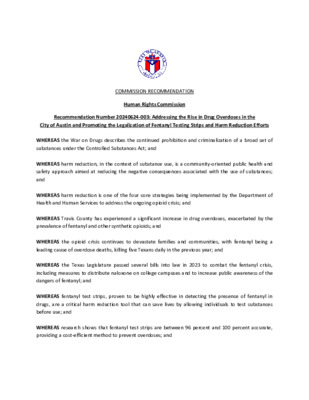Recommendation 20240624-003: Fentanyl Testing Strips and Harm Reduction — original pdf
Recommendation

COMMISSION RECOMMENDATION Human Rights Commission Recommendation Number 20240624-003: Addressing the Rise in Drug Overdoses in the City of Austin and Promoting the Legalization of Fentanyl Testing Strips and Harm Reduction Efforts WHEREAS the War on Drugs describes the continued prohibition and criminalization of a broad set of substances under the Controlled Substances Act; and WHEREAS harm reduction, in the context of substance use, is a community-oriented public health and safety approach aimed at reducing the negative consequences associated with the use of substances; and WHEREAS harm reduction is one of the four core strategies being implemented by the Department of Health and Human Services to address the ongoing opioid crisis; and WHEREAS Travis County has experienced a significant increase in drug overdoses, exacerbated by the prevalence of fentanyl and other synthetic opioids; and WHEREAS the opioid crisis continues to devastate families and communities, with fentanyl being a leading cause of overdose deaths, killing five Texans daily in the previous year; and WHEREAS the Texas Legislature passed several bills into law in 2023 to combat the fentanyl crisis, including measures to distribute naloxone on college campuses and to increase public awareness of the dangers of fentanyl; and WHEREAS fentanyl test strips, proven to be highly effective in detecting the presence of fentanyl in drugs, are a critical harm reduction tool that can save lives by allowing individuals to test substances before use; and WHEREAS research shows that fentanyl test strips are between 96 percent and 100 percent accurate, providing a cost-efficient method to prevent overdoses; and WHEREAS despite bipartisan support in the Texas House of Representatives, the bill to decriminalize fentanyl test strips did not pass in the Senate, leaving Texas as one of the few states where these lifesaving tools remain illegal; and WHEREAS public health experts, families affected by fentanyl-related tragedies, and medical professionals advocate for the decriminalization and widespread availability of fentanyl test strips to reduce overdose deaths; and WHEREAS other states have successfully implemented the distribution of test strips through community health centers, convenience stores, and vending machines, sometimes for free, demonstrating their feasibility and efficacy in harm reduction efforts; and WHEREAS legal barriers to accessing fentanyl test strips hinder harm reduction organizations from receiving funding and distributing these essential tools to those in need; and WHEREAS the availability of fentanyl test strips allows individuals to make more informed decisions, potentially preventing drug use or modifying usage behaviors to reduce the risk of overdose; and WHEREAS bipartisan efforts at the federal level, including proposed legislation by Texas Senator John Cornyn and others, aim to remove test strips from the federal drug paraphernalia statute, which would eliminate the need for separate state-level legislation. NOW, THEREFORE, BE IT RESOLVED by the City of Austin's Human Rights Commission recommends that the City of Austin: 1. Supports the Decriminalization of Testing Strips: We recommend that the City of Austin call upon the Texas Legislature to prioritize the decriminalization of fentanyl test strips in the next legislative session, recognizing their critical role in reducing overdose deaths and saving lives. 2. Lobbying Efforts: The City of Austin's lobbying arm is recommended to advocate for and uplift bipartisan efforts to decriminalize fentanyl test strips at both the state and federal levels. This includes supporting legislation that aims to remove fentanyl test strips from the federal drug paraphernalia statute and any state-level bills that facilitate their legal distribution and use. Public Health Initiative: The City of Austin is recommended to work with local health organizations, community centers, and other stakeholders to educate the public about the importance and use of fentanyl test strips and other harm reduction tools. 3. 4. Support for Harm Reduction Programs: The City of Austin is recommended to reaffirm its commitment to supporting harm reduction programs that provide resources and education to individuals at risk of drug overdose, including the distribution of fentanyl test strips, naloxone, and other lifesaving tools. 5. Education: The City of Austin may join partnership with the Austin Independent School District’s Board of Trustees to develop a cohesive educational strategy. This effort will equip school counselors, nurses, administrators, and parent support specialists with literature and resources to aid teens in navigating the opioid crisis within our community. 6. Collaboration with State and Federal Entities: The City of Austin is recommended to collaborate with state and federal entities to ensure a coordinated response to the opioid crisis, advocating for comprehensive strategies that address prevention, treatment, and harm reduction. BE IT FURTHER RESOLVED that the City of Austin’s Human Rights Commission urges immediate action to prevent further loss of life and to provide individuals with the tools they need to make informed decisions and stay safe. Date of Approval: June 24, 2024 Record of the vote: The recommendation was approved on Commissioner Clemmons’ motion, Vice Chair Zeidan’s second on a 10-0 vote. Commissioner Krueger was absent. Attest: _____________________________________________ Eric Anderson, Staff Liaison, Office of the City Clerk